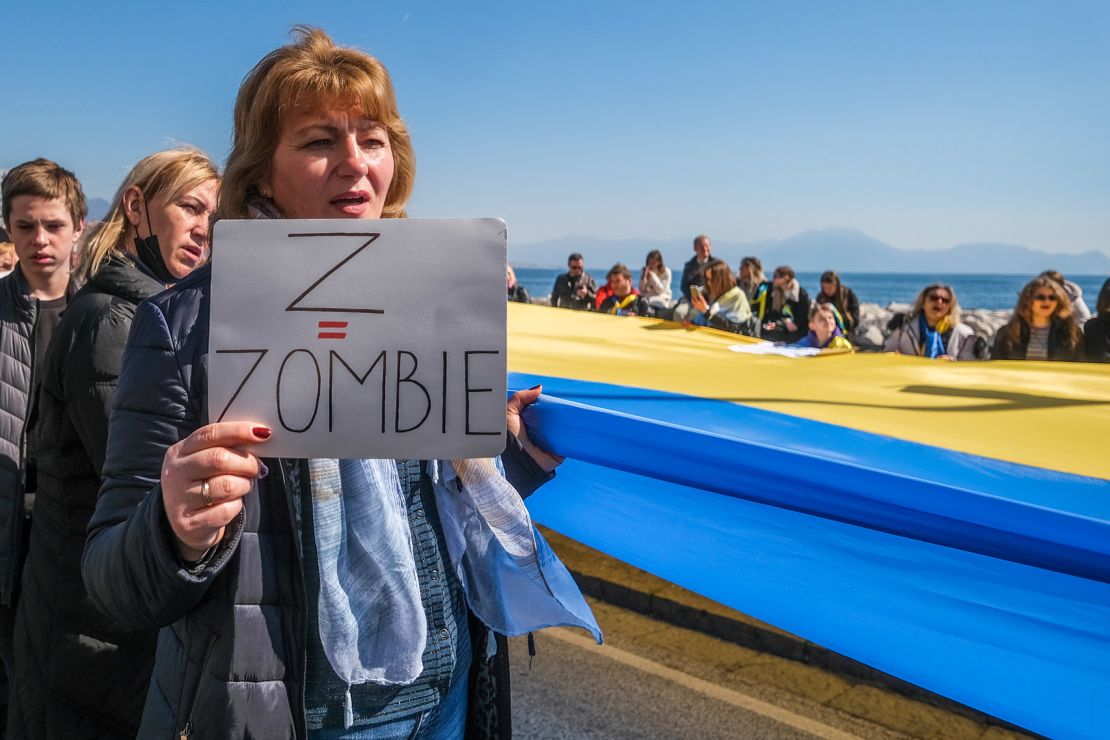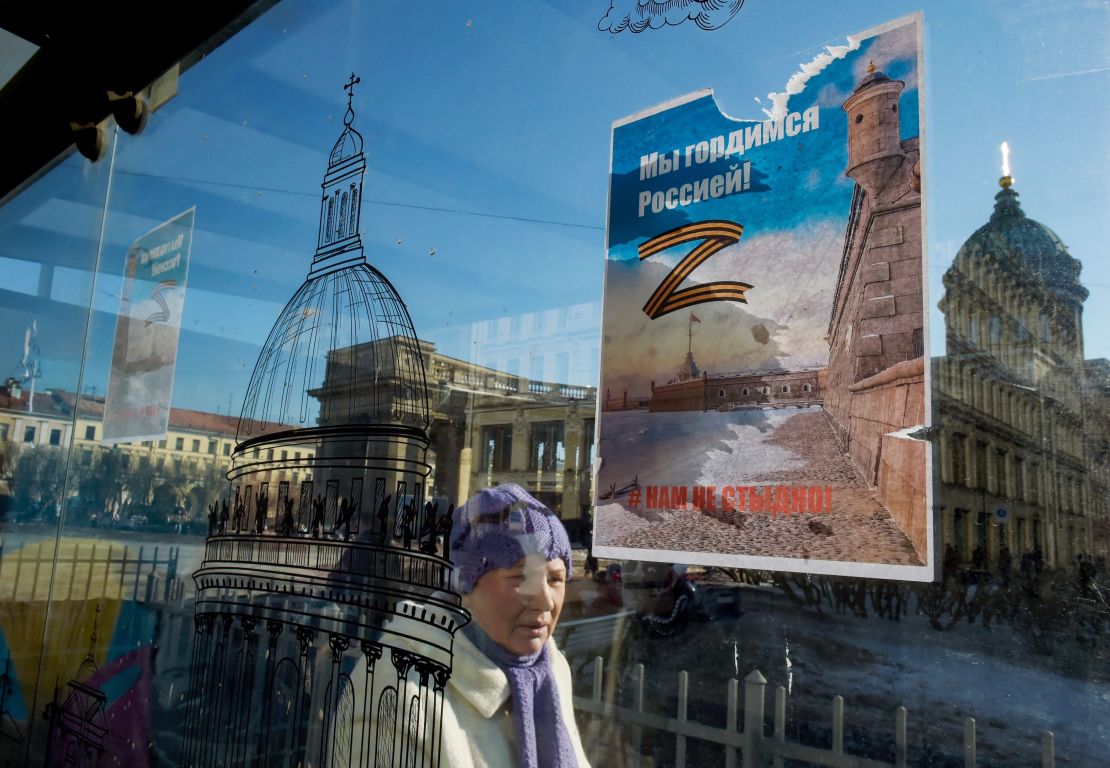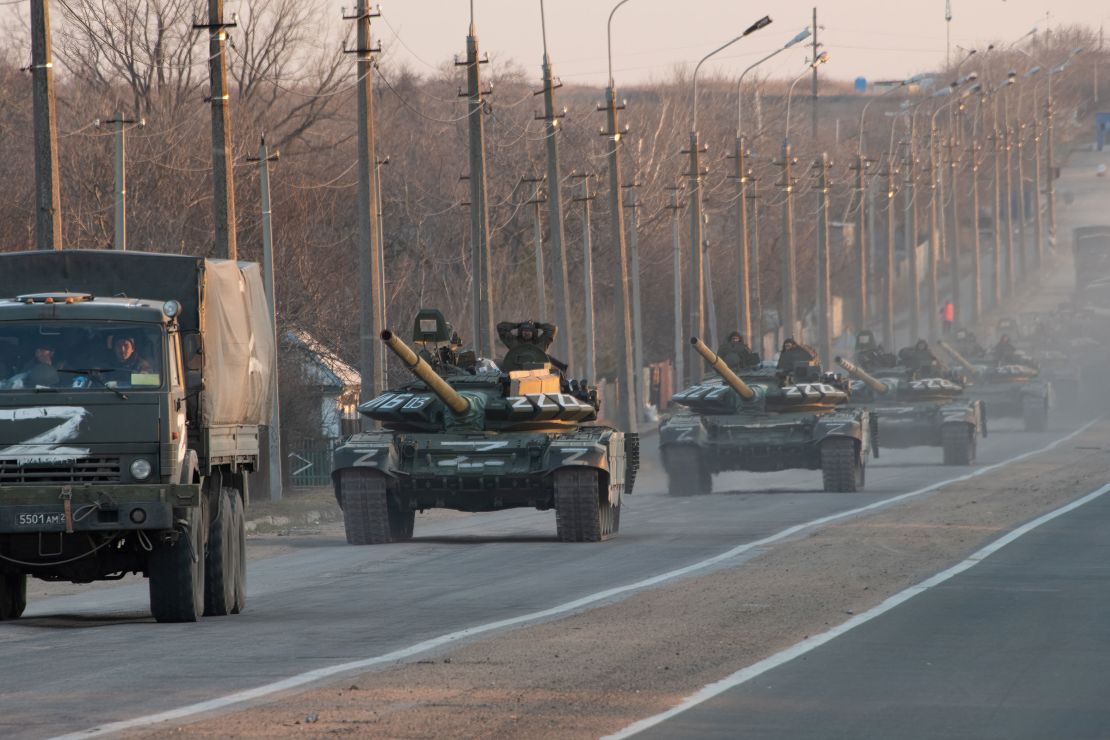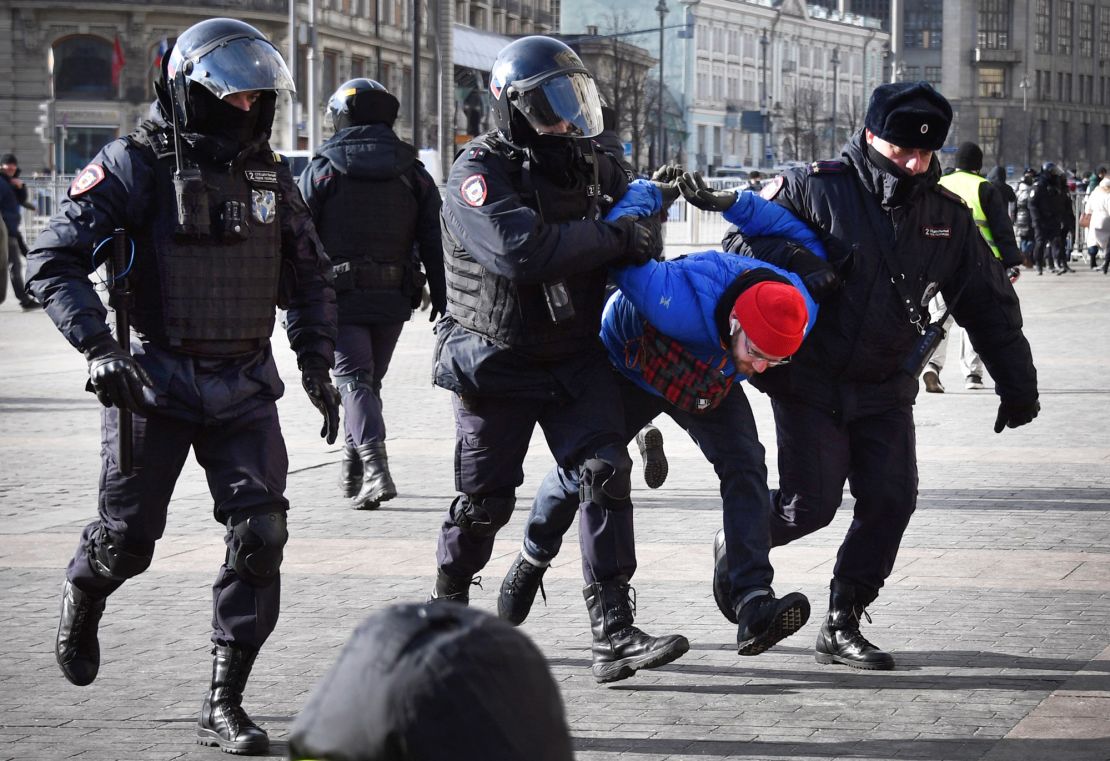Marija Stonyte picks up her phone and anxiously dials in a number. After a couple of rings, a woman picks up.
“I’m calling to tell you a very important message. I don’t know if you know a lot about what is actually happening right now in Ukraine,” Stonyte says in the call last month, her voice trembling as her 1-year-old daughter babbles in the background.
There’s silence on the other end of the line.
“The real truth is that it is a terrible invasion.”
This is one of dozens of cold calls that Stonyte and her husband make every day to people in Russia from their home in Lithuania as part of a volunteer initiative aimed at penetrating Russia’s so-called digital iron curtain.
Russia’s ongoing onslaught in Ukraine has seen cities bombarded, civilians killed, and more than 4 million flee the country. But at home, many Russians know little about what is unfolding.
Russia has banned state media from calling Russian President Vladimir Putin’s “special military operation” an “invasion” or a “war,” and those who criticize the offensive can face severe punishment.
A Moscow court banned Facebook and Instagram for carrying out “extremist activity,” and a new censorship law made publishing “fake” information about the invasion punishable by up to 15 years in prison. The pressure has forced independent news outlets to pull out or shut down, leaving a void for state media to fill with propaganda and disinformation.
Desperate to break through, people around the world are trying creative ways to connect with Russians. Online activists Anonymous claim to have hacked Russian TV channels to broadcast footage from Ukraine.
Others, like Stonyte, are trying a more individual approach. They’re cold calling or messaging strangers in Russia, hoping their personal pleas will disrupt the Kremlin’s propaganda – and potentially even help put an end to the deadly war.
‘Make the most important call of your life’
When Russia launched its invasion of Ukraine on February 24, documentary filmmaker Stonyte and her husband Mantas Kazlauskas watched the news from their home in the Lithuanian port city of Klaipeda.
Stonyte, 30, grew up in Lithuania after the Baltic state declared its independence from the Soviet Union in 1990. While she doesn’t remember Russia’s occupation, the Russian threat never really went away, she said.
When Russia invaded Ukraine, Stonyte said she felt “a sense of desperation and helplessness.”

The couple began calling businesses, museums and restaurants in Moscow and St. Petersburg, hoping to tell them about what was happening. Days later they stumbled across CallRussia.org, an initiative launched March 8 with the tagline: “Make the most important call of your life.”
Co-founded by Lithuania-based creative agency director Paulius Senūta, the initiative aims to cold call 40 million phone numbers across Russia. The team gathered publicly available phone numbers in Russia and created a platform that randomly generates a phone number from the list. A user can opt to call over the phone, Telegram, or WhatsApp, and at the end of the call, a site pop-up asks the user whether they got through, and if so, if the call went well.
The idea is based on Senūta’s belief that Russian people have the power to end the war if they have access to free information and understand the human suffering in Ukraine.


“There’s a lot of support (in Russia) for this (war),” Senūta told CNN last month. “But the funny thing about it is they don’t know this war. They don’t know, hundreds, thousands of people killed, bombs dropped, children killed, women giving birth in metros – they know nothing about it.”
With the help of psychologists, Senūta’s team of about 30 people put together a script to guide the calls. They didn’t want to get into a confontation – instead the goal is to “convey the human tragedy and the fact that they don’t know about it.”
In just one week after the CallRussia launch, thousands of volunteers made 84,000 phone calls, he said.
Stonyte says few people hang up. Instead, most fall into one of two categories – those who argue back, and those who listen, she said. Stonyte believes many people may not want to respond out of fear the call could be monitored and they could face punishment.
One call to a museum in Moscow stuck with her, Stonyte said, even though the person who picked up the phone said very little. Her husband – who speaks some Russian – helped to translate the words conveying the horror of Putin’s war.
“I believe that even silence between my husband and that woman was really important,” Stonyte said. “I mean, she didn’t hang up the phone. She waited for a long time, she wanted to hear every single word.”
‘They exist in another reality’
It’s not just strangers that Ukrainians are trying to reach.
A couple of days into the war, Ukrainian restauranteur Misha Katsurin wondered why his father, who lives in Russia, hadn’t called to check on him.
But when he called his father himself, Katsurin found something disturbing: his father simply didn’t believe there was a war.
Even as Katsurin described being woken by blasts and hiding in a bomb shelter, his father remained incredulous. “They exist in another reality,” he said. “He wants to believe me, but he cannot,” he said.
Katsurin’s father consumes Russian state media, which has been presenting a very different narrative of how the war is unfolding. On March 2, for instance, when Russian military strikes hit schools and cathedrals in Ukraine’s second biggest city, Kharkiv, banners on Russian state TV channel RT claimed 40 Ukrainian towns and villages had been liberated.
Even the impacts of Western sanctions – which are now being felt by ordinary people in Russia – aren’t mentioned in Russian daily news reports.
To help others in a similar position, Katsurin started a website called Papa Believe which offers tips on how to talk to friends and family about the war in Ukraine. For those who falsely claim, as Putin has done, that Ukrainian government leaders are “Nazi,” he recommends telling them Zelensky is from a Ukrainian-Jewish family. When people claim the invasion is not a war, but a “special operation,” he recommends explaining that one country has crossed the border of the other and is shelling and capturing cities.

In a recording of a subsequent call with his father, published to his site, Katsurin tries to counter his father’s ideas – that Russians in Ukraine are oppressed, that the United States is making Slavic people kill each other.
At the start of the call, Katsurin seems hurt. “I’m calling to tell you what’s been happening in my life and in my country, things that I see with my own eyes, but you don’t believe me.” By the end of the call, his father seems swayed. “I sincerely understand your feelings and I’m so worried for you,” he tells his son.
But convincing a stranger can be even harder.
Henkka, a Finnish man based in Estonia, who asked to only be identified by his first name, set his location on dating app Tinder to St. Petersburg, got tipsy, and went on a mission to tell Russians about the war in Ukraine.
Although Instagram and Facebook have been blocked, dating apps are still accessible. “How To” guides have sprung up on social media platform Reddit, advising people how to use Tinder’s passport feature – which allows users to connect with people in other countries – to share information about Ukraine with Russians. Users share tips on how to create a credible fake account and match with as many people as possible without getting banned by the Tinder algorithm – Tinder says it may delete accounts using the app to promote messages.
With each match, Henkka opened the conversation with “Hi! Have you heard the news about Ukraine?” Henkka said he was surprised by how many of the people he spoke to knew about the invasion but remained lukewarm about the issue or were simply confused by conflicting accounts in Russian and Western media.
“They truly didn’t know what to trust,” Henkka said.
‘Some changes is going to happen’
Cold calling doesn’t always have the desired effect.
Serge Kharytonau, a Belurusian now based in the US, where he works as a media expert at the International Strategic Action Network for Security, says he has made about 120 calls to Russia since early March as part of the CallRussia initiative – but so far, he hasn’t had the impact he hoped for.
Fewer than a handful of the calls he’s made have been successful, Kharytonau says. In most cases the respondent becomes aggressive or quickly ends the call. Kharytonau says that what’s been most surprising is that Russians he has spoken to don’t just reject alternative information – but deny the fact it exists at all.

He says that while Russian people are victims of the propaganda that’s imposed upon them, it would be “a great mistake” to think they bear no responsibility.
“On one side, they’re the victims of the propaganda. But on the other side, it’s their decision to trust the propaganda and to deny even not just the alternative Information, but even the fact that alternative information exists.”
The reality, though, is that speaking out in Russia can potentially come with heavy consequences.
A Russian journalist, for instance, was found guilty of organizing an unauthorized public event and fined 30,000 rubles ($370) after protesting the Ukraine invasion during a live television broadcast. More than 14,763 protesters have been detained in 151 Russian cities since the start of Russia’s invasion, according to OVD-Info, an independent human rights protest-monitoring group.
Stonyte, the Lithuanian cold caller, is more sympathetic to the difficulties for Russians. Her hope is that Russians spread the truth of what is happening in private, and eventually, they might be able to protest against Putin’s regime.
“At the moment, the problem is that only a relatively small percentage of people are against war,” she says. “The government can easily silence and arrest them. They couldn’t arrest the whole nation (if the Russians were united).”
For now, she’s just focused on calling. And the call with the Russian woman last month is one of the more successful she has made.
During the call, as Stonyte starts recounting what’s happened in Ukraine, the woman appears to agree with what she’s hearing, according to a recording of their call shared with CNN. She tells Stonyte she knows everything but is afraid to act on it because she has a baby. She and her partner are thinking about leaving Russia, she says.
As they talk, their children can be heard chattering in the background – and both women are moved to tears.
“I really hope you will find a way and you will be safe in this situation,” Stonyte tells the woman.
“We are both mothers and we understand how important is the safety of our children. When we live with these kinds of governments, it is impossible to be completely safe, to feel safe in your own home. So I just really hope that some changes is going to happen.”
